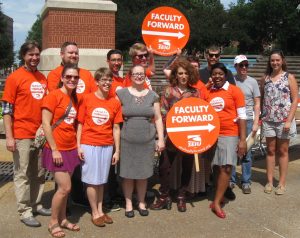
By CARL GREEN
Correspondent
St. Louis – Graduate students who work for their universities are one of those groups that need a union but have been denied the right to organize, so they have had to teach and perform research for unlivable low wages.
That may start to change because of a decision on Tuesday, Aug. 23, by the National Labor Relations Board (NLRB) that the graduates at private universities are not just students but also school employees, and that administrators must recognize the union locals they join. Only a small fraction of graduate students at public universities are currently represented by unions. Public universities are covered by state labor boards and not the NLRB.
Across the country and in St. Louis, graduate students and union organizers have begun the hard work of making connections with eligible students that could lead to them joining unions.
Here, about 15 working graduate students gathered under a hot sun at the clock tower on the main campus of St. Louis University last week to celebrate the decision and make plans to continue that work. Service Employees International Union Local 1 is reaching out to an estimated 2,500 graduate students in the St. Louis region to provide them with a union home.
DAY TO CELEBRATE
At the rally, Elizabeth Eikmann, a graduate student who also teaches in the SLU American Studies Department, called it a day for rejoicing and preparing for the hard work to come.
“Today, I think, is all about celebrating, gathering together and sharing our stories, sharing our experiences and finding a way to move forward and find that solid ground that we can all stand on together to address what we see as a crisis in higher education,” she told the rally. “We want to be sure that student voices are prioritized alongside faculty voices and adjunct faculty voices, and with this landmark decision, I think that we’ll be able to do that together.”
She acknowledged the role of graduate students at Columbia University in New York, whose organizing work led to a petition to join the United Auto Workers two years ago. That petition was rejected, but the case led to last week’s decision.
“We’re not just operating here at SLU alone, we’re a part of a larger national movement and owe a great debt to the brave and hard-working students at Columbia who fought this great fight on the front lines for us,” Eikmann said.
“We’re standing here on SLU’s campus today, but we’re also standing alongside other university campuses in the area,” she added. “We have representatives from Washington University who are out here today. As St. Louis graduate students stand together, we stand alongside graduate students all across the nation.”
The NLRB decision overturned its decision made in the 2004 Brown University case that collective bargaining for graduate students would undermine graduate education.
SOMETHING OF VALUE
In the meantime, adjunct faculty members have been making steady progress at universities, and one of them, Jameson Ramirez, of SLU’s Sociology-Anthropology Department, joined the rally to celebrate with the graduate students.
“As a graduate assistant – someone who works very, very hard – you are a student in a certain way,” he told the group. “But ultimately, you are contributing as a worker to this institution in a more meaningful way.
“This is a confirmation of what we as adjuncts have been working toward, and that is the recognition that we provide something of value to this institution, and that it is only fair that to we who contribute something of value, something of value be returned.
“As a representative of the adjuncts here who have unionized successfully, let me say we celebrate with you and we stand in full solidarity as you continue to fight.”
Eikmann said she takes classes, teaches undergraduate courses, and serves as a research assistant and teaching assistant. But she has also found time to meet with other eligible graduate students to work toward an organizing campaign, and that work can now continue with the confidence of legal backing.
“That will be our next step. We know that there is a true end goal,” she said.
At this point, she said, it’s hard to say how many are affected, but it’s at least in the hundreds at SLU. “Every department has a body of students who are qualified,” she said.
CHANGES COMING
SEIU President Mary Kay Henry said the changing education scene requires changes in students’ legal rights.
“As colleges act more like big corporations, they shift more financial risk and uncertainty onto the shoulders of graduate student workers, who are already striving to balance the demands of their research and scholarship with the needs of their undergraduate students,” she said.
“This decision gives graduate student employees the opportunity to join faculty at nearly 50 universities who have joined SEIU since 2013 and have won dramatic improvements in their pay, working conditions and built a growing movement to transform higher education.”

